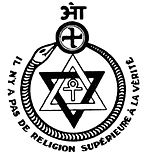 The Theosophical Society was an organization formed in 1875 by Helena Blavatsky to advance Theosophy. The original organization, after splits and realignments, currently has several successors.[1] Following the death of Blavatsky, competition within the Society between factions emerged, particularly among founding members and the organisation split between the Theosophical Society Adyar (Olcott-Besant) and the Theosophical Society Pasadena (Judge). The former group, headquartered in India, is the most widespread international group holding the name "Theosophical Society" today.
The Theosophical Society was an organization formed in 1875 by Helena Blavatsky to advance Theosophy. The original organization, after splits and realignments, currently has several successors.[1] Following the death of Blavatsky, competition within the Society between factions emerged, particularly among founding members and the organisation split between the Theosophical Society Adyar (Olcott-Besant) and the Theosophical Society Pasadena (Judge). The former group, headquartered in India, is the most widespread international group holding the name "Theosophical Society" today.Formation
The Theosophical Society was officially formed in New York City, United States, on 17 November 1875 by Helena Petrovna Blavatsky, Colonel Henry Steel Olcott, William Quan Judge, and others. It was self-described as "an unsectarian body of seekers after Truth, who endeavour to promote Brotherhood and strive to serve humanity." Olcott was its first president, and remained president until his demise in 1907. In the early months of 1875, Olcott and Judge had come to realize that, if Blavatsky was a spiritualist, she was no ordinary one. [2] The society's initial objective was the "study and elucidation of Occultism, the Cabala etc."[3] After a few years Olcott and Blavatsky moved to India and established the International Headquarters at Adyar, in Madras (now Chennai). They were also interested in studying Eastern religions, and these were included in the Society's agenda.[4] After several iterations the Society's objectives evolved to be:
Sympathy with the above objects was the sole condition of admission to the society. The Society was organized as a non-sectarian entity. The following was stated in the Constitution and Rules of the Theosophical Society
The Society reformulated this view in a resolution passed by the General Council of the Theosophical Society on December 23, 1924.[6]


No comments:
Post a Comment